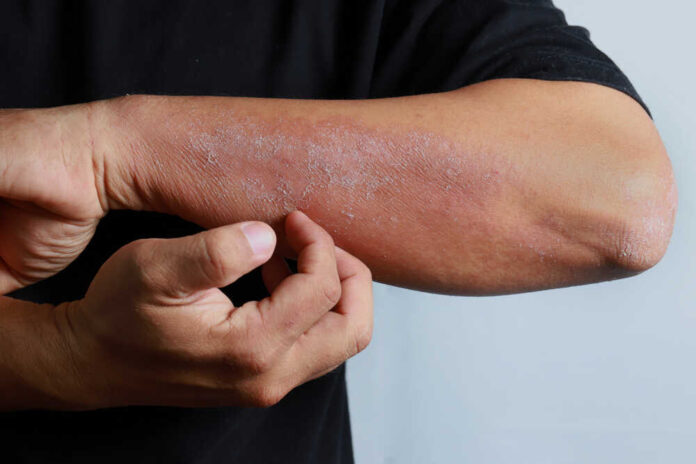
Eczema, medically known as atopic dermatitis, is a skin condition that primarily results in itchy, red, and inflamed patches of skin. This chronic, relapsing condition can be mild, manifesting as small areas of dryness, or severe, presenting as extensive areas of red, cracked, and bleeding skin.
Despite its widespread prevalence, comprehensive management of this condition often proves elusive. Existing treatment modalities focus on symptom control but seldom address the underlying factors. Eczema’s roots lie in an intricate interplay between genetic factors, an overactive immune system, environmental triggers, and a compromised skin barrier function.
- The Role of the Microbiome
Scientists are gradually recognizing the significance of the skin’s microbiome — a bustling metropolis of microorganisms that reside on the skin’s surface. Research now indicates that eczema flare-ups could be linked to disruptions in this complex ecosystem.
Instead of over-sanitizing, consider integrating prebiotic or probiotic skincare products into your routine (along with probiotic foods in your diet). These foster a healthier skin microbiome, potentially leading to improved skin resilience and reduced eczema symptoms. - Hydration: The Inside-Out Approach
While keeping the skin externally moisturized is a staple advice, hydrating from the inside is a largely untapped strategy. Increasing your daily water intake and consuming hydrating foods like cucumber, watermelon, and berries can improve skin health on a cellular level, providing your skin with the necessary moisture it needs to combat eczema. - Respecting Your Skin’s Circadian Rhythm
Just like our bodies, our skin follows a circadian rhythm. During the day, it focuses on protection, and at night, it switches to repair and regeneration mode. Syncing your skincare routine with your skin’s rhythm, using protective products in the morning and nourishing products at night, can potentially enhance their efficacy and support your skin in its natural battle against eczema. - The Impact of Stress
Stress is often an overlooked catalyst for eczema flare-ups. Modern lifestyles can exacerbate stress levels, leading to inflammation and a weakened skin barrier. Mindfulness techniques, such as meditation or deep-breathing exercises, along with progressive muscle relaxation, art therapy, or cognitive behavioral therapy, can serve as powerful tools to manage stress and potentially mitigate eczema symptoms. - Cold Showers
Warm baths might seem comforting but could worsen eczema symptoms by drying the skin. Cold showers, on the other hand, can potentially help to tighten the pores, seal in moisture, and reduce inflammation, making them a paradoxical yet effective ally in the battle against eczema. - The Role of Indoor Air Quality
A less discussed aspect of eczema management is indoor air quality. Dry air can dehydrate the skin, exacerbating eczema. An air humidifier can help maintain optimal indoor humidity levels, offering a more conducive environment for skin health. - Ingredient Literacy: A Closer Look at Labels
Understanding the composition of skincare products can be a huge help. Avoiding products with known irritants and choosing ones with skin-soothing ingredients can make a marked difference in managing eczema. Developing ingredient literacy empowers you to make informed choices for your skin’s health. - Sun Protection
UV rays from the sun can trigger inflammation and worsen eczema symptoms. Integrating a broad-spectrum sunscreen with SPF 30 or higher into your daily routine, regardless of the weather, can help protect your skin from harmful UV exposure. Sun protective clothing and hats, when feasible, add an additional layer of protection and should not be underestimated. - The Skin-Gut Connection
The gut-skin axis is a burgeoning area of research that underlines the connection between gut health and skin conditions. A diet rich in fiber, antioxidants, healthy fats, and probiotics can help maintain a healthy gut, potentially benefiting skin health and helping to manage eczema. - Embracing a Personalized Approach
Every individual’s experience with eczema is unique. The triggers, symptoms, and effective management strategies may differ significantly. Embracing a personalized approach, keeping a symptom diary, and working with a dermatologist or skin care specialist can help design a targeted strategy to manage eczema.






















